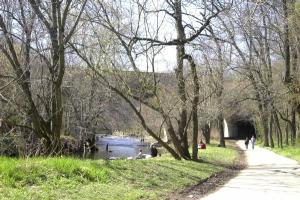(Excerpts/edits, and reflections from my reading, “Dreams: A Way to Listen to God” by Morton Kelsey, Paulist Press, 1978. ISBN: 0-80911-2046-1)
• 99% of the time when you dream about others, you are really dreaming about some part of yourself (whether positive or negative).
• Dreaming about war or fighting nearly always has to do with inner conflict.
• Certain universal themes/plots like being chased by a shadowy figure, or finding a new area in a house, have to do with reconciling issues of the inner person, or self-discovery.
• Dreams abide in the realm of symbols. Watch for repetition, patterns, and the associations you have to the symbols in waking life to start to better understand them.
• Dreams can carry both personal and universal symbols, and point out places for personal growth, increased harmony, and prosperity (on all levels).
• If you feel your dreams are important, and take care to begin logging them, you will harvest much personal growth, (including interpersonally) and can experience added spiritual awareness.
• Whether we remember them or not, we dream 5-7 times per night. In studies, animals and humans deprived of dreams develop mental health issues.
If you would like to share comments on dreams or share a powerful dream here, go right ahead.
To discuss your dreams and their potential meanings privately, you may contact me through my website.

 It was an uncharacteristically mild day, and I took a long bike ride. The recent inclement weather left the roads with gravel and debris in many spots–quite a danger for a cyclist. My riding buddy commented that a good rain would wash away the problem, and make it right again to ride more safely. It made me think of the cyclical system of nature–the rains that clean and restore. And also the approach of springtime. Rebirth. The theme of regeneration (and seasons/cycles) is ever present with us. It’s ingrained into the fabric of our experience, and I think our human nature. We want to start over. We crave rejuvenation. though change can be frightening, it also means liberation–and we know it deep down in the marrow. It is a reminder–all around–that the spiritual, and the Divine, is as close as one allows it to be.
It was an uncharacteristically mild day, and I took a long bike ride. The recent inclement weather left the roads with gravel and debris in many spots–quite a danger for a cyclist. My riding buddy commented that a good rain would wash away the problem, and make it right again to ride more safely. It made me think of the cyclical system of nature–the rains that clean and restore. And also the approach of springtime. Rebirth. The theme of regeneration (and seasons/cycles) is ever present with us. It’s ingrained into the fabric of our experience, and I think our human nature. We want to start over. We crave rejuvenation. though change can be frightening, it also means liberation–and we know it deep down in the marrow. It is a reminder–all around–that the spiritual, and the Divine, is as close as one allows it to be.